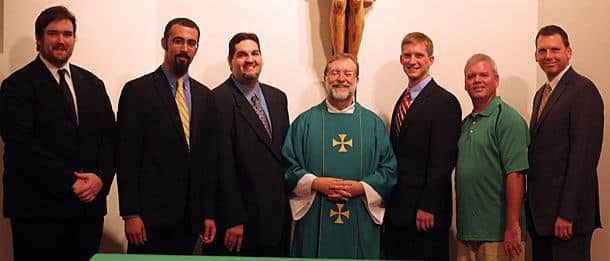August 29, 2011

Five men took their first step toward the Paulist priesthood Aug. 27 as they officially became Paulist novices during a Mass at St. Paul’s College in Washington, D.C. Mark Alblinger, Matthew Berrios, Ryan Casey, Steve Petroff and Stuart Wilson-Smith will spend the next year learning about and living in the Paulist community and discerning their call to the priesthood.
The members of the 2011 novice class will make their first profession in the community next fall when they commit themselves to live according to the Paulist constitution for the following 12 months and begin academic studies for the priesthood.
“The novitiate is a time for these men to really deepen their relationship with the Lord Jesus Christ,” “and from there become men of mission who proclaim the Good News through their actions and example.”
From there, Father Colgan said, the five novices will begin to engage the Paulist charism by becoming men who will preach the Good News, seek unity among Christians, work toward understanding between religions and become reconcilers.
The novices will also be exposed to Paulist history and tradition, and introduced to the writings and experience of Paulist Founder and Servant of God Father Isaac T. Hecker and his companions, according to Father Colgan.
All of this will prepare the novices for their Lenten apostolate, where the six men will experience the Paulist charism through hands-on ministry in one of the 23 Paulist faith communities and centers in North America.
The members of the 2011 Paulist novice class are:
- Age: 43
- Hometown: Titusville, Fla.
- Education: Bachelor’s degree in geography from California State University at Fullerton.
- Occupation: High school teacher
The Paulist emphasis on interfaith relations attracted Mr. Albinger to the Paulists.
“I know a lot of non-Catholics who are always asking me questions about the church,” he said. “Even people who have fallen away from the church are asking how to come back.”
- Age: 22
- Hometown: Grand Rapids, Mich.
- Education: Bachelor’s degree (double major) in music performance (classical guitar) and philosophy from Grand Valley State University in Allendale. Mich
Mr. Berrios said he was called to the Paulists because of the community’s outreach to inactive Catholics and the marginalized. “This ministry is so needed in the church in the United States,” he said.
- Age: 33
- Hometown: Rockford, Ill.
- Education: Bachelor’s degree in sociology from Augustana College in Rock Island, Ill.
- Occupation: College residence life counselor, parole officer and his family’s supermarket business
Mr. Casey found the Paulists through the Busted Halo® Radio show, hosted by Paulist Father Dave Dwyer on Sirius XM Radio, and learned, “it is OK to be a spiritual seeker. That grew into moving back to and reconnecting with the church.”
- Age: 47
- Hometown: Los Angeles
- Education: Bachelor’s degree in Hispanic language and literature from Oakland University in Rochester, Mich.; Master’s degree in Hispanic literature from Georgetown University
- Occupation: Communications and marketing
During his novitiate, Mr. Petroff hopes to “get to know the Paulists, and get to know Paulist ministry and mission.”
- Hometown: Fredericton, New Brunswick
- Education: Bachelor’s degree in history from the University of Toronto.
- Occupation: Professional musician and music stores
Mr. Wilson-Smith came to the Paulists because, “the Paulists don’t want to condemn or conform modern culture, but engage it. They act as a bridge between modern culture and the church.”